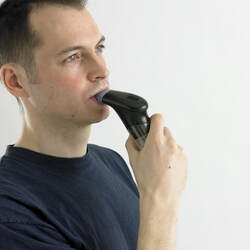My thoughts on breathing...
A bit more information as it occurs to me about how breathing impacts your health and well-being. If you have questions or want me to address a particular topic, please don't hesitate to contact me!
 Inspiratory muscle training, or IMT, is simply a form of strength training for your breathing muscles that help you breathe in. The main inspiratory (inhale) muscles are the diaphragm and intercostals (rib muscles). These muscles do the lion's share of the work of breathing at rest. When we are more active, secondary muscles are called upon to help increase the volume of the lungs by expanding the ribcage. These muscles are in the neck, chest, shoulders and back - there are lots of helper muscles for breathing when we are active! The muscles we use for breathing are just like any other muscle in the body and can weaken due to illness, injury, aging or disuse. Well, it's not like we intentionally not use our breathing muscles, but sometimes when we rely more on our secondary muscles of breathing (those ones in the neck/chest/shoulders), then it can lead to underuse of the diaphragm. I find that people with asthma, allergies and anxiety tend to use these helper muscles more than their diaphragm. This in turn can lead to premature shortness of breath with activity, and sometimes even unexplained breathlessness at rest. Anyway, just like our other muscles, the breathing muscles can also benefit from strength training. Except for that it is hard to simply lift a weight with your diaphragm. And although general cardiovascular exercise - like walking, running or riding a bike - does improve your breathing, it sometimes isn't specific enough to address the muscle weakness of the breathing muscles. Often, when the muscles are weak, they will limit how much you can push yourself in exercise. So researchers began to look at what happens when you specifically strengthen your breathing muscles. By creating a device that adds resistance when you breathe in, they found that they could specifically target the inspiratory muscles. They also found that this increase in strength produced not just better breathing, but also improvements in a wide variety of things - blood pressure was lowered, sleep was improved, breathlessness was reduced and in some athletes, performance was improved! Over the coming weeks, we will highlight some of the latest research on inspiratory muscle training - maybe you will see how it can benefit you!
0 Comments
Your comment will be posted after it is approved.
Leave a Reply. |
AuthorI'm a physiotherapist who is passionate about educating anyone and everyone about the impact breathing has on our health. Archives
November 2020
Categories |